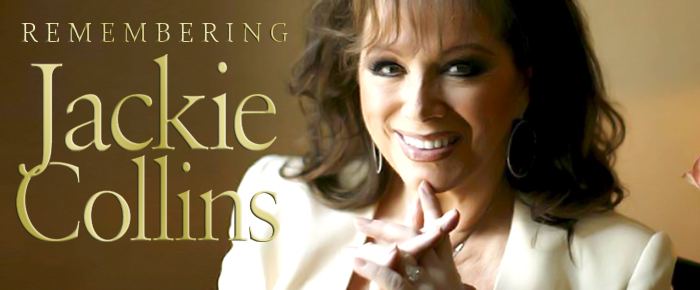
By Heidi Simmons
My first experience reading Jackie Collins’ was in Palm Springs. I picked up a used paperback discarded as poolside fodder. With its cover already warped by water and it pages crinkled by wet fingers, there was no worry of damage. It turned out to be a terrific read while floating blissfully on the pool.
Damage, however, was done to my skin because I did not –-could not—put the novel down. I read it in and out of the pool the whole day. The chapters passed easily by as the sun moved across the sky. The splashing ruckus and fun loving guests around me, peaked and waned while I was in a world of colorful characters tangled in scandal and sex.
Jackie Collins died Saturday, September 19, of breast cancer in Los Angeles. She was 77 years old.
With 30 New York Times bestsellers and over 500 million books sold in more than 40 countries, Collins was brilliant at weaving salacious tales of the rich and famous, the powerful and powerless, the glamorous and pretentious of Hollywood’s elite and all the shady characters who surround them.
Collins was born in London. As a teen, she read and then rewrote Mickey Spillane novels in long hand. She would write overtly sexual stories for her classmates who paid to read them. A self-professed troublemaker, Collins dropped out of high school at age 15.
Moving to Hollywood in the late 50s, Collins followed her older sister, actress Joan Collins. She became an insider and decided to write about the strangely addictive world of stardom. Jackie is quoted on her website as saying, “I write about real people in disguise. If anything, my characters are toned down — the truth is much more bizarre.”
Collins’ first novel, The World is Full of Married Men, was published in 1968. When a British Member of Parliament claimed the book was filth, after reading it, the book was catapulted to bestseller status in England. Banned in some countries, the material was not only sensational for its adulterous nature, but because its women characters were strong minded and driven by their own desire for sex and success.
This was Collins’ literary forté. She could write about women as they struggled and fought for what they wanted in their male dominated world. Yes, women were abused and used by men — that happens in real life — but her women also used and abused men. Collins wrote about modern women who carved out their own way in the world. She showed us their strengths and their vulnerabilities.
Collins celebrates the sex scene allowing women to orgasm without mincing words or avoiding body parts. Many writers today use: “He touched my sex.” What’s that suppose to mean? Collins never had a problem using the words penis, vagina or hard-on. Author E.L. James could learn a thing or two from Collins sexual maturity and prowess.
In one interview Collins said: “I’ve never felt bashful writing about sex. Sex is a driving force in the world so I don’t think it’s unusual that I write about it.”
Some may consider the sex in her books gratuitous, but Collins took her time developing the relationships before the characters jumped into bed. Like foreplay, the reader is involved and understands the characters first, so when the sex happens everyone is on the same sheet – so to speak. I have no doubt, Collins helped women better understand their body, their partners’ body and the joy of orgasm.
One of Collins’ most popular characters is Lucky Santangelo. With a series of nine books, Santangelo could be considered heroic. The woman comes from a misogynistic East Coast mob family and rises to power as a Hollywood mogul. Even though Santangelo is not a saint, if anyone deserves a Glass Ceiling award, it’s Lucky. Collins even wrote The Lucky Santangelo Cookbook in 2014. After all, the character is not only a formidable businessperson, but a good cook, wife and mother.
With 34 novels to her credit, Collins revealed an elusive, private universe where the wealthy and powerful one percent with all their money and fame, still have their problems and are just as flawed as the rest of us. The characters may be beautiful, live in mansions, ride in limos and have elegant and interesting friends, but their lives are still complicated and often treacherous.
Collins had a knack for story telling. She could weave the narrative so that every chapter felt like a cliffhanger. Love them or hate them, the characters are layered and full of surprises that keep a reader engaged. Several of her novels have been adapted into movies and television series.
Critics considered Collins’ work trashy and lowbrow, yet millions of people around the world enjoy her books. Trashy or not, that is literary success! There is no shame in reading a story if it holds your attention. A wise man told me: “The person who does not read is no different from the person who cannot read.”
Highbrow and lowbrow aside, in January 2014, Collins attended the Rancho Mirage Writers Festival. She spoke to a sold-out crowd closing night. The festival is a celebration of the written word and clearly, coordinators appreciated the value of Collins’ contribution. What a wonderful event and special memory for those who attended.
Sunshine, water and frivolous entertainment made my long ago Palm Springs visit fantastic! It introduced me to Collins’ work and inspired me to read more of everything. I’m grateful for all the fun she provided. Thank you Jackie Collins. Rest in peace.











































